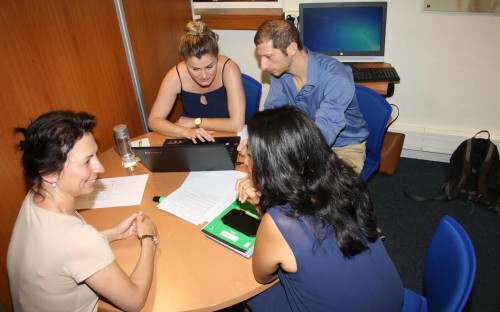There, MBA students took part in a four-day business simulation game, Intopia – a virtual business world where online companies interact globally creating a whole virtual economy.
The challenge was to compete against nine other teams to become the virtual world’s leading company. The four days were divided into quarters. At the end of each quarter, the results were published and students’ companies were ranked based on factors like financial performance and sustainability.
Thrown into a pressure-cooker environment, IUM MBA students sold products, negotiated deals, identified new markets, and analyzed data over four days of frantic action.
“It’s extremely intense,” says Francis Bidault, an adjunct professor at IUM who guided the educational technology - edtech - simulation. “You see people being totally engaged and committed to their team. They see that they have to make decisions and then live with the consequences.”
In most traditional business school simulations, teams are given a virtual but already existing company. IUM takes its model from the corporate world. Teams start with a $20 million investment fund, and decide where to set up their business in a given value chain. Francis acts as a referee, a facilitator, and an advisor, charging companies virtual fees.
“We want to emphasize that students’ roles as managers is not just to administer business, but to develop business,” he explains.
“Our simulation is very much about entrepreneurship and business development – adjusting business to the evolution of the market. Students have to spot opportunities and find the best way to approach them.”
Throughout, MBA students realize the impact of their decisions across all the dimensions of a company, gaining a multi-disciplinary view of management and building the teamwork skills to prepare them for the real-life business environment.
“In most academic assignments you are on your own,” Francis continues. “In a business simulation, you have to manage a company in a team context. The decisions you make are not just your decisions; they are the consensus of the different members of the team.”
Jose Amador, a full-time IUM MBA student on the finance specialization, enjoyed working with students from a variety of different backgrounds in a high-pressure environment.
“Stress levels went up and we could feel some tensions within teams and between them. Even under pressure, our team worked very well together,” he says.
25% of IUM MBA alumni have created their own successful businesses. After his MBA, Jose wants to launch a finance-related business in Monaco.
“The program has allowed me to meet many interesting people and a few potential partners,” he continues. “Concerning the milestone week, my main take-away was to make sure to be well-prepared and understand the rules applicable to my industry. Competition is tough, mistakes are expensive, and you cannot take the risk to not know regulation inside-out.
“Your team is also a pillar to your success. Pick the right people to work with because the best business idea can turn into a nightmare if you’re surrounded by the wrong people!”
IUM’s Milestone Weeks focus on personal development, the environment, and disruptive new technologies. Past seminars have focused on topics like big data, blockchain, and renewable energy.
“The Milestone Weeks are dedicated to assessing each student’s own leadership profile, and developing and enhancing the student’s personal, and professional, leadership potential,” Marika Taishoff, IUM’s MBA program director, explains.
“Business simulations have been a hallmark of the IUM MBA for the past seven years – a way for students to immerse themselves in a dynamic and challenging situation, and apply just about everything they have learned throughout the year.”
RECAPTHA :
77
77
cb
3e









